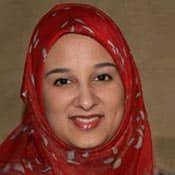How do we move away from Muslims ostracizing each other or judging each other's "Muslimness"?
SA: I think that sometimes we get so caught up in being defensive that we can't interrogate ourselves. We need to have more dialogue within the Muslim communities. We need to hear each other's stories and try to refrain from judgment. We must learn that we cannot judge each other if one does not wear a hijab or if you don't see someone praying. We are one ummah, but we are different at the same time.
Does being Muslim in America bring you closer to your faith?
MR: I've been living in Syria for the past two-and-a-half years and have just returned to America. Before I left, everyone told me you're going to a Muslim country, and you're going to be more religious and your kids will be more religious. But I felt I was a much better Muslim here in the States than in Syria. I feel this is the best country in the world to be a Muslim. It's harder, it takes more effort, all eyes are on you, but at the end of the day you go to bed with a contented heart.
Many wonder if Muslims can be Muslim and American at the same time. What are your thoughts?
ZS: Many people clearly think that one is going to overtake the other. When I taught in Egypt, many students said, "You can't be Muslim and American at the same time. Americans are Christian." So it's not only non-Muslims who think this. Our communities on a larger scale are not understanding of the diversity in America.
Above all, I'm a Muslim, wherever geographically I happen to be. My American identity pales in comparison to my trying to be a Muslim. I do love my country, but I also love my faith and my family. If someone put a gun to my head and said choose what you love, I'd have to choose my faith and family. But I love being in America. I choose to be here more than any other place. I love my family and my God, more. I don't see that I'm a threat.
Why do people focus on labels: Muslim, American, American Muslim?
SA: We have a need to categorize, because it helps us figure out how to deal with x person or y person. When we are confronted with something that is different, we have to categorize it as something completely other than ourselves. When I teach about Islam, we talk about perceived oppression. Muslim women's clothing is oppressive. It's harder for my students who are American-born to think about women's clothing differently.
ZS: People confuse culture with Islam. There's a lot of confusion about cultural oppression with Islam. In one of our engagements, the audience was majority white and very open-minded, but not very informed. One woman raised her hand and said, "In a mosque, men are in front and women are in back. I don't see how you can see that in anything but a negative light." I told her that in Islam, women aren't shoved in the back because they don't matter. It's about respecting our privacy, that [women are] highly valued, and therefore [the mosque] is going to set up this place to protect you, but not in a condescending way.
I think of hijab as an extension of the mosque. You can take a hijab with you, but you can't take the mosque with you. I'm not going to say that every woman willingly wears the hijab. If you are coerced to wear it, that's un-Islamic. It's un-Islamic to oppress.





